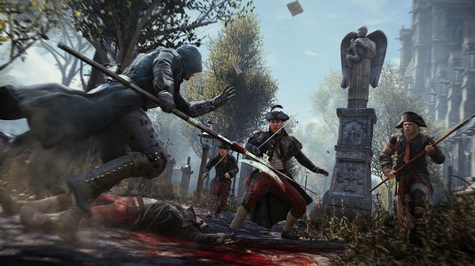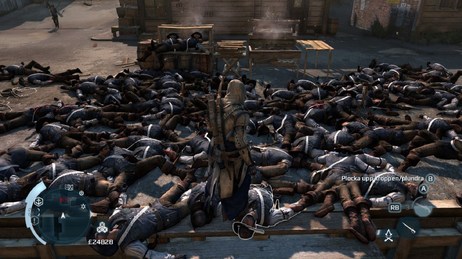
If there’s one image that encapsulates the Assassin's Creed series, it’s that of a hooded-figure, who is usually hectically overpowered, with the unusual capability to subdue and tame enemy foes in a split-second. Breaking resistance of every Templar stooge has always been comely in itself and a palatable additive for admirers of the creed, but the absence of difficulty and struggle in deadly encounters has become too palpable to ignore, notably for those beginning to become fatigued by the up- close and personal style of the open-universe game.
The founders at Ubisoft have now leaped into the fray with Unity, the publisher’s new stellar entry to the franchise, and have removed the infamous one-hit counter button, to consolidate stealth and spur a more muted approach to game-play.
 Arno engages the enemy in Assassin's Creed: Unity
Arno engages the enemy in Assassin's Creed: Unity For those who are in high spirits, over the seemingly improved system or for those who haven’t yet considered it before, here’s the issue. Forcing counters to the wayside will undoubtedly urge players to wage their fight in the shadows, but extracting a practice that has been revamped so much that it has now been rendered trivial, delineates the inventor’s confusion for what the action-adventure game stands for. The very first wholly last-generation of Assassin's Creed games, went through a myriad of changes, each seemingly rebuilding on the carnage of adversaries, most strikingly when we stepped foot in the revolutionary war of Colonial America in Assassins Creed III. Beside the basic infantry, dispatching the heavy weighted attackers may have still been leisurely satisfying but killing in the game was fuelled by animation – the duo kill manoeuvre - an allure that transcended the game above all its predecessors. The encounters tended to be quite visceral but the excellently gruesome double kill animations exhibited in the game disclosed the kind of stance the creators will be using in forthcoming follow-ups.
Now that the makers of Unity have discarded the concept of painless close-quarters, by putting an end to the contentious counter button, and harking back to a more subdue game-plan shows the series inconsistencies and what the developers are attempting to enact with their new cosmic invention. It is inconceivable to think after years of putting effort to expand the games rigorous combat, with the incorporation of cinematic double kills, for the creators to make a passive verdict and squander away years of hard work to overhaul a design that wasn’t fully crippled.
 Connor stands amongst a mass of bodies in Assassin's Creed III
Connor stands amongst a mass of bodies in Assassin's Creed III In all, the gaming initiators at Ubisoft need to undergo significant changes and replicate some of the expansions that the developers of the next Arkham game have inserted, and obtain an equitable balance between action and stealth rather than strip the game from its core mechanics as an all out action adventure to swiftly changing the game to a predominately stealth encounter.
En garde!

Are you happy with the direct Ubisoft is taking with this franchise? Let us know in the comments below, or via our Facebook/Twitter accounts!

 RSS Feed
RSS Feed
